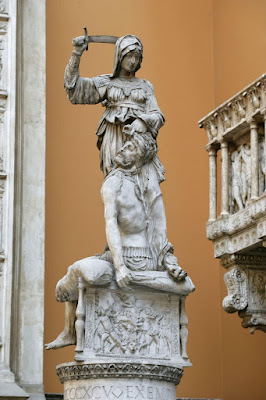 |
| Oronzio Lelli Judith beheading Holofernes ca. 1455 plaster cast (19th century) of bronze original in Florence Victoria & Albert Museum, London |
 |
| Titian Judith with the Head of Holofernes ca. 1515 oil on canvas Galleria Doria-Pamphilij, Rome |
 |
| Riccio (Andrea Briosco) Judith with the Head of Holofernes ca. 1515-30 bronze plaquette National Gallery of Art, Washington DC |
 |
| Giovanni della Robbia Judith with the Head of Holofernes ca. 1520 glazed terracotta statuette Museum of Fine Arts, Boston |
 |
| Barthel Beham Judith with the Head of Holofernes ca. 1525-27 engraving National Gallery of Art, Washington DC |
 |
| Girolamo Romanino Judith with the Head of Holofernes 1531-32 fresco Castello del Buonconsiglio, Trento |
 |
| Lambert Sustris Judith with the Head of Holofernes ca. 1548-51 oil on canvas Palais des Beaux-Arts de Lille |
 |
| Anonymous Flemish Artist Judith with the Head of Holofernes ca. 1550-1600 boxwood statuette Victoria & Albert Museum, London |
 |
| Paolo Veronese Judith with the Head of Holofernes ca. 1575-80 oil on canvas Kunsthistorisches Museum, Vienna |
 |
| Jacopo Tintoretto Judith and Holofernes ca. 1577 oil on canvas Museo del Prado, Madrid |
 |
| Domenico Tintoretto Judith with the Head of Holofernes ca. 1595 oil on canvas Museo del Prado, Madrid |
 |
| Joachim Wtewael Judith with the Head of Holofernes ca. 1595-1600 oil on canvas Princeton University Art Museum |
 |
| Jan Saenredam after Hendrik Goltzius Judith with the Head of Holofernes ca. 1600 engraving Scottish National Gallery, Edinburgh |
 |
| Jan Saenredam after Lucas van Leyden Judith with the Head of Holofernes ca. 1610 engraving Teylers Museum, Haarlem |
 |
| Gerrit Pietersz (called Sweelinck) Judith with the Head of Holofernes 1605 oil on canvas Museum Boijmans Van Beuningen, Rotterdam |
 |
| Guido Reni Judith with the Head of Holofernes ca. 1620 drawing Fine Arts Museums of San Francisco (Achenbach Foundation) |
from Annunciations
O Love, subject of the mere diurnal grind,
Forever being pledged to be redeemed,
Expose yourself for charity; be assured
The body is but husk and excrement.
Enter these deaths according to the law,
O visited women, possessed sons. Foreign lusts
Infringe our restraints; the changeable
Soldiery have their goings-out and comings-in
Dying in abundance. Choicest beasts
Suffuse the gutters with their colourful blood.
Our God scatters corruption. Priests, martyrs,
Parade to this imperious theme: "O Love,
You know what pains succeed; be vigilant; strive
To recognize the damned among your friends."
– Geoffrey Hill (1958)